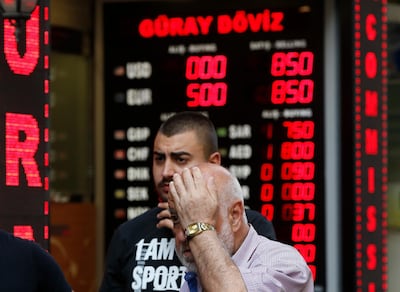A Qatari pledge to inject $15 billion into the Turkish economy to stave off its collapse is set to deepen divisions with its neighbours and puts Doha in the cross hairs of US retaliation.
Analysts described the announcement, made during a trip at the eye of the crisis to Turkey by Qatar’s emir Sheikh Tamim bin Hamad Al Thani, as a risky move by the emirate at a time when it is isolated from key neighbours.
Sir Ivor Roberts, an advisor to the Counter Extremism Project and retired British ambassador, warned that Qatar’s aid to Turkey would put further distance between Doha and its traditional allies. The fallout for Qatar and Turkey would be felt beyond the region.
“Erdogan has painted himself into a corner and is making a terrible mistake if he thinks President Trump is more likely to de-escalate than escalate,” he told The National. “Qatar has been going its own way with a variety of undesireable groups and decisions such as this put it on very thin ice.
“It’s not likely to get away with it this time,” he said. "It will be more isolated not less."
Ghanem Nuseibeh, a senior visiting fellow at King’s College London, said the Qatari leader made the trip to Turkey as payback for Mr Erdogan’s support after the country’s neighbours boycotted the GCC state in 2017. Qatar has been shunned for more than a year over its financing of terrorism and support for Islamist extremists. Turkey had in effect demanded Qatar’s backing.
“This is clearly a political move as a result of a demand by Turkey which Qatar could not turn down due to the close political alliance between the two,” he said. “Qatar is politically stuck and this investment is seen by many as a political blackmail by Turkey.
“Qatar finds itself unable to break out from this alliance with Turkey and Iran as long as the conflict with its Arab neighbours is not resolved. Qatar is politically stuck."
_______________
Read more:
Turkish lira tumbles to 5.86 over threat of more US sanctions
US says more sanctions await if Turkey does not free pastor
Erdogan says US set deadline for pastor's release
Erdogan tells US: Turkey will find new friends
Turkey's economic crisis is of Erdogan's making
_______________
For its part, America refused to back down on its imposition of sanctions on Turkey’s economy despite the $15 billion lifeline for President Erdogan that left Doha in the position of choosing between allies with troops on its soil.
Larry Kudlow, director of the National Economic Council, said Thursday the 50 per cent tariff on Turkish steel imports was a reflection of how “dissatisfied” Mr Trump was with Turkey.
Hours after the news of cash injection was reported, Mike Pence, the US vice-president, tweeted that the parties to what President Erdogan has described as an “economic war” would be foolhardy to test Donald Trump’s determination. The Turkish lira breached 7 to the dollar after US sanctions were imposed to secure the release of Andrew Brunson, an American preacher held for meeting Kurdish activists.
“Pastor Andrew Brunson is an innocent man held in Turkey & justice demands that he be released. Turkey would do well not to test @POTUS Trump’s resolve to see Americans who are wrongfully imprisoned in foreign lands returned home to the United States,” Mr Pence said.
HSBC analysts estimate that the impact of Qatar's multi-year pledge will be limited given that Turkey's dollar denominated external financing has reached $238 billion for this year alone. It is likely to be eaten up by spiralling inflation, oil costs for the Turkish consumer have risen 73 per cent since the currency collapsed.
Yet Turkish analysts described Qatar's decision as a "show of solidarity". "Relations between Doha and Ankara are very special, very different from other nations in this region," Serkan Demirtas, a political analyst and journalist told the Chinese newsagency Xinhua.
For Mr Nuseibeh the danger is that despite its large revenues from gas sales, Doha’s heavy expenditure to shore up diplomatic alliances could mean the country squanders its legacy. Meanwhile even $15 billion is unlikely to delay the day of reckoning for the Turkish economy for long.
“Qatar is already over stretched in terms of its liquidity and $15 billion is a significant amount of investment for Qatar, but such an amount is not going to provide a long term solution to Turkey’s woes,” he said.



